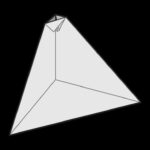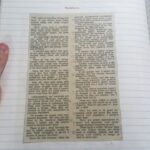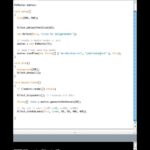The show opened to what I perceived to be a little confusion from Singaporean audiences. I couldn’t understand it at first, but a quick survey amongst friends has just revealed that… geode is apparently not actually a common or well-known word amongst a public/general audience of Singaporeans! ALAMAKKK!
Geode!! A word which I assumed that everyone learnt as a child, because I had already known of geodes when I was very young. I am shocked! Stunned like vegetable! Even amongst my peers who are brilliant and intelligent in their own right and in their respective fields of practice, apparently “geode” is a specialist term that does not enter the common vernacular here!
If you’re Singaporean (born and educated here) and reading this, I really want to know if you knew what the word “geode” means without googling it first.
Here is a definition of “geode”:

Whilst making the work “Space Geodes“, my visual reference board looked like this – a lot of geodes + bismuth ingots. Bismuth is not a geode per se, but an important visual reference for me – i wrote an entry about bismuth on this blog in 2014):

I actually thought a lot about how I wanted the form to be instantly recognisable as a “geode”, and made several pencil sketch studies of the ways in which geodes are sliced and presented, especially with regards to specimens from mineral shops that circulate in the hands of amateur collectors. And actually, I called it a “space geode” because I wanted to be cheeky about how it was also about turning a human space into something almost alien or from outer space – for things like fossils and ruins become interesting to us because of a perceived break in human understanding that we need to bridge. However, I hadn’t realised that the very concept of “geode” might be TRULY ALIEN and unknown to some!??
As a young child I remember being given a purple coloured booklet about rocks which came with a bubble pack of different semi-precious rocks, which made me aware of the different names of rocks. I remember there being a tiger’s eye, banded agate, red jasper, rose quartz, turquoise, hematite, sodalite, and amethyst. Also, this must have been an American book because it also talked a lot about spelunking (cave exploring). (As an adult I learnt that the term “spelunking” was only used in the US, whereas it was called “potholing” in the UK).
UPDATE!!!: My mother found the book in the house! I wrote the paragraph above before I went to bed, and in the morning my mother fished the book out and I was vindicated to find that my memory did not fail me with regards to the rock names! The DingParents bought it from Toys R Us and gave it to me when I was 6, meaning this book is over 25 years old! It also contains a little section about GEODES, so I’m guessing this is where I first learnt the word “geode”.




However… despite giving me such amazing access to books and information from an early stage of my life (yay to the Parents on their excellent strategy!), my parents did not actually read this book themselves, and therefore they themselves did not know what a geode is…
I showed them these following pictures which I took last week at Fu Lu Shou Complex, home of mystical antiquities, mysterious amulets, and religious relics (a shopping centre tellingly named 福禄寿 after the Daoist idea of fu/fortune – lu/status – shou/prosperity), but my parents looked at my pictures and identified these as “fengshui stones”. I wonder what others call these? I’m guessing other people might also just identify them as “fengshui objects” or “crystals”?


Thinking about how one learns about geological terms in one’s life – I also learnt words like magma and pyroclastic cloud from simply watching movies like “Dante’s Peak”, which I probably first saw aged 13 in 1997. I remember that I liked the movie so much that I even printed out random film reviews of the movie which I had found from the internet and kept it in a file, as a weird way of preserving a memento from the film! (Because I felt at the time that it would be unlikely for me to encounter a volcano or a geological feature like that) Please don’t tell me I was the only weird geeky child here who learnt all these terms by accident??
I was told that some people also know of the word “geodes” via POKEMON because of Geodude (geode+dude?), a boulder pokemon who… erm…. rolls around. So people know geode might be a stone. But then, in Pokemon, the Geodude is never really officially pictured cracked open to show his presumably crystalline insides…

I suppose there have been very few opportunities or means for people to learn about geology or geosciences in Singapore – it is something I’ve talked about for some time. I mean, I was very surprised to learn that in the UK some schools offered Geology as an A level subject, because it does not seem to figure in our curriculum. (Can any teachers confirm this?) Geology is part of Earth Sciences, but I’m guessing that the closest you might get to learning about geology in schools might be via geography. But Geography in Singapore is classed as a humanities subject, and not the most popular one at that, as I remember an article very recently about it:
Straits Times 22Feb 2016 – Updated JC geography curriculum worries some:


Google Trends on the interest in the word “Geode” shows a declining number of people searching for the word in the last few years:
But this is people “searching” for the word. It may mean that either (1) they don’t know it and are searching, or that (2) they knew it but wanted to look for more information about geodes. The “trend” numbers do not make this distinction, of there being possible different intentions behind the search for information.
So, how do we determine text complexity? Whilst writing this I realised that a function that used to be in Google search last year has disappeared! To be honest, I never really used it much whilst it was available, but for some time there used to be a reading level function for Google search, and it used to be listed on this official google search filter list. Now the reading level filter is gone from the list as well. A quick look online reveals some discussion about how it was quietly removed in May 2015 without any announcement on any google blog.
See:
Google Drops Another Search Filter: Reading Level
Google Removes Reading Level Filter
Reading Level allowed users to search for texts which were in one of 3 levels – basic, intermediate, and advanced. This allowed children or readers with difficulties to look for basic texts which would be more suitable for their reading level, and on the other end of the spectrum it allowed advanced users to look for more complex, or technically-oriented articles.
In principle I don’t really like the idea of dividing knowledge up into levels because I think that my current knowledge about the world was gained by ignoring what constitutes “specialist” knowledge vs what is “amateur knowledge”. I just read everything and I think it would be great if more people were unafraid of complexity. But this is just my individual view. And on the negative side, it may also explain why some of my work and the mode in which I present my own work so far may seem a little too complex/wordy for many people.
But still, I think it would be interesting to try to see how one might develop one’s own metric for what constitutes “text simplicity” or “text complexity”. Current tests for it (eg: Flesch–Kincaid readability tests, Coleman-Liau Index, Gunning fog index, SMOG index, and Automated Readability Index) appear to use word length, sentence length and syllable count, and sometimes checks a text against a list of difficult words.
I really have to get on with other urgent work now so I must end here for now, but the text complexity issue seems worth further investigation when I have more time to sit down and experiment with it….
Space Geodes is currently being shown at SingaPlural 2016, on the second floor of block C where it will be on show until 13 March 2016.
99 Beach Road
7-13 March 2016
11am-10pm daily
More about SingaPlural 2016: http://singaplural.com
More info on “Space Geodes”: http://openurbanism.blogspot.sg/2016/03/space-geodes-digital-archaeology-and-3d.html







